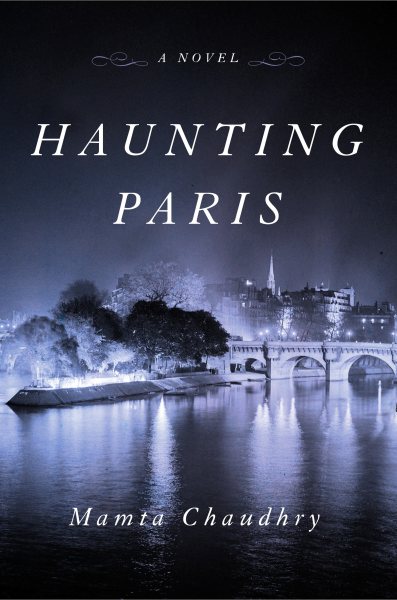By Seetha Srinivasan. Special to the Clarion-Ledger Sunday print edition (June 23)
In the end a lifetime is not enough, the heart yearns for more. Who can reason with desire? The heart has its reasons that reason cannot know.
One day Sylvie will push open that curtained door to come to me, and despite all that I have known, at the sight of her I will finally believe that all losses are restored and sorrows end.
 These words of Julien, the spectral protagonist of Mamta Chaudhry’s Haunting Paris, begin and conclude the novel, the crux of which is the story of the Jewish psychologist Julien and his lover, music teacher Sylvie. Haunting Paris is set in 1989 and recounts Sylvie’s search for Julien’s sister Clara’s daughter who vanished in war-time Paris. Clara and another daughter perished in the Holocaust. Julien, wracked with guilt for not being able to save his sister and her family, is convinced that one of his nieces is alive and spent years searching for her. After his death, a chance find of a letter impels Sylvie to continue Julien’s quest.
These words of Julien, the spectral protagonist of Mamta Chaudhry’s Haunting Paris, begin and conclude the novel, the crux of which is the story of the Jewish psychologist Julien and his lover, music teacher Sylvie. Haunting Paris is set in 1989 and recounts Sylvie’s search for Julien’s sister Clara’s daughter who vanished in war-time Paris. Clara and another daughter perished in the Holocaust. Julien, wracked with guilt for not being able to save his sister and her family, is convinced that one of his nieces is alive and spent years searching for her. After his death, a chance find of a letter impels Sylvie to continue Julien’s quest.
This is the barest outline of the plot. Like all fine fiction, it is in its unfolding that Haunting Paris captivates.
We witness the romance of the upper-class married Julien and his sensitive lover Sylvie, the lives of his children and his wife Isabelle (who will not give up Julien), Sylvie’s discovery of the letter that allows her to trace the lives of Clara and her daughters, and the fortuitous encounter that brings their story full circle.
Chaudhry narrates with sensitive attention the lives of her main characters and brings the same skill to drawing portraits of her entire cast, among them: the kindly concierge Ana Caravalho, sisters Marie and Mathilde who protect Clara and her daughters only to unwittingly betray them, and Sylvie’s American lodgers Alice and Will with their experiences of life in Paris.
The novel moves easily between its setting during celebrations of the bicentennial of the Revolution and the horrors of war-time Paris and Nazi atrocities. Chaudhry’s ability to sustain this structure even as she risks having a ghostly narrator is impressive.
The city seems almost a character in itself, and Chaudhry’s evocation of Paris is superb. Her ability to render telling details and convey the sights, sounds, and the very texture of life puts the reader at its center. Those who know Paris will revel in this marvelous re-creation; those who do not will finish the novel wishing to visit.
It is primarily through Julien’s eyes that we view Paris and its history. “But when the Bastille fell into their hands, they discovered half-a-dozen prisoners in the fortress, seven to be precise, and the faces of the freed men gaped at their jailer’s severed head, both wearing identical expressions of astonishment at this shift of power from the grasp of kings into the hands of the people.”
On the Eiffel Tower: “I admire the way its sequined lights shine like early stars in the dark, the filigreed ironwork making it seem to float weightlessly, for all its substance, an inspired emblem for the city of light—in both senses of the word—not just luminosity but also lightness, which we prize above all, in wit, in art, in life.”
Haunting Paris, with its complex and intriguing structure, carefully researched historical details woven with adroit and meticulous care into the narrative, deeply sympathetic characters whose story moves between mysteries of past and present showing the myriad ways in which the past never loses its hold, is indeed, as Kirkus noted: “an elegant debut.” It is also an absorbing must-read.
Seetha Srinivasan is the director emerita of the University Press of Mississippi.
Mamta Chaudhry will be at Lemuria on Wednesday, June 26, at 5:00 p.m. in a joint event with Alex Ohlin (author Dual Citizens) to sign and discuss Haunting Paris.


Comments are closed.